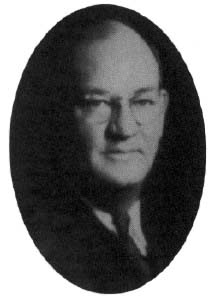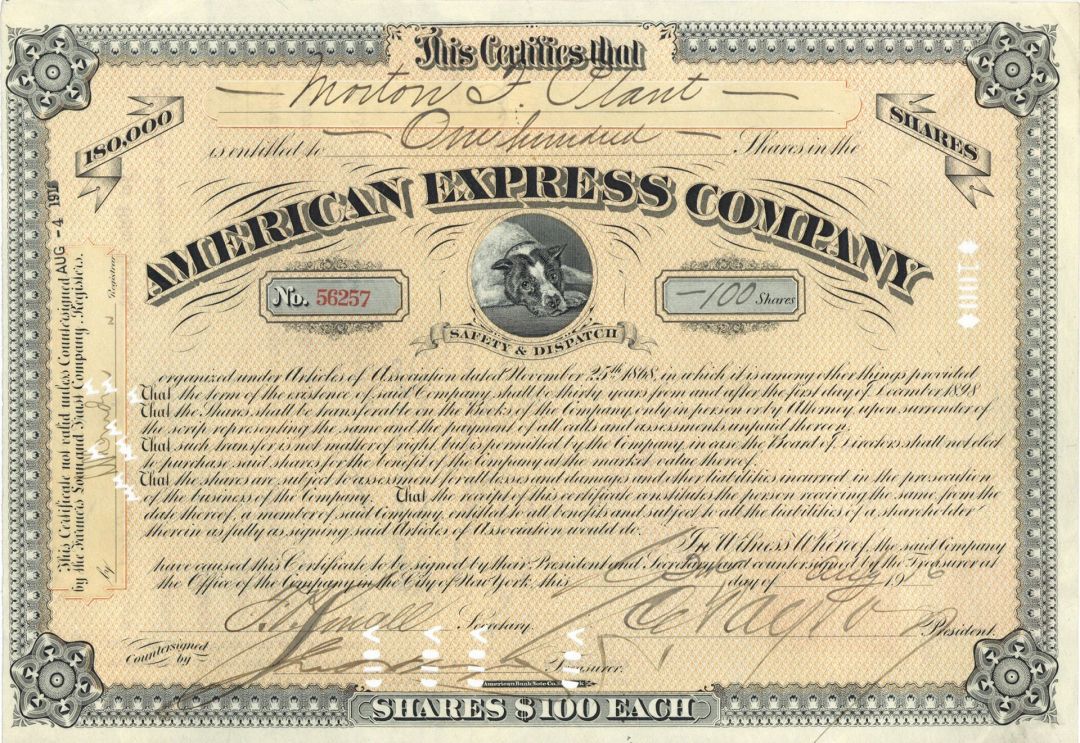American Express Co. Signed by James F. Fargo, George C. Taylor and Fred P. Small - 1916 dated Autograph Stock Certificate
Inv# AG2577 StockStock signed by James F. Fargo (son of James C.) as president, F.P. Small as secretary and George C. Taylor as treasurer. Printed by American Bank Note Co., New York. Rare! More research necessary on James F. and Fred P. Small. Note that this stock is a different variety from the 1870's version.
The Michigan Central Railroad, designated by the reporting mark MC, was established in 1846 with the purpose of providing rail connectivity between Detroit, Michigan, and St. Joseph, Michigan. Over time, the railroad expanded its operations to include the states of Michigan, Indiana, and Illinois in the United States, as well as the province of Ontario in Canada. Following approximately 1867, the railroad came under the control of the New York Central Railroad, which subsequently became part of Penn Central and later Conrail. Following the dissolution of Conrail in 1998, a significant portion of the former Michigan Central tracks is now owned by Norfolk Southern Railway.

James Congdel Fargo (1829-1915) was the son of James Fargo and began his career with Wells & Co., where his brother, William George Fargo, was a partner, in Buffalo in 1844. In 1866, after serving as agent and manager of the firm's successor, the American Express Company, he relocated to New York to assume the role of General Superintendent and Manager. By 1881, he had advanced to the position of President of both the American Express Company and the Westcott Express Company, as well as the National Express Company. As the president of American Express, James C. Fargo enjoyed considerable wealth and recognition. Thus, it was understandable that he felt slighted when he encountered difficulties cashing checks during a trip to Europe in 1890. The European bankers, unfamiliar with him, refused to honor his checks. This incident raised the question of whether Americans would consistently face cash challenges while traveling in Europe. In response, Marcellus F. Berryn, an employee of American Express, sought to devise a solution. He later remarked, "Every individual has a unique way of signing their name. Therefore, a reliable method for carrying money to unfamiliar locations must include the bearer’s signature and stipulate that it will only be cashed upon the addition of a matching signature in the presence of witnesses." On July 7, 1891, Berryn was awarded four copyrights for what he termed "the travelers cheque," with William C. Fargo receiving the first one. A few weeks later, he successfully cashed a fifty-dollar cheque in Leipzig, Germany, without any issues. In 1891, American Express sold travelers checks amounting to $9,120.00, and this figure has consistently increased each year, reaching $24.6 billion in sales by 2000.

George Caldwell Taylor (May 29, 1885 – December 19, 1952) served as a district judge for the United States District Court for the Eastern District of Tennessee. He was born in Greeneville, Tennessee, and earned an Artium Baccalaureus degree from Tusculum College in 1906, followed by a Bachelor of Laws from the University of Tennessee College of Law in 1908. Taylor practiced privately in Rockwood, Tennessee, from 1908 until 1911. He then held the position of Secretary to the Governor of Tennessee from 1911 to 1913, after which he resumed his private legal practice in Greeneville until 1921. From 1921 to 1928, he served as the United States Attorney for the Eastern District of Tennessee. On May 24, 1928, President Calvin Coolidge nominated him to fill a vacancy on the United States District Court for the Eastern District of Tennessee, previously held by Judge Xenophon Hicks. The United States Senate confirmed his nomination on May 26, 1928, and he received his commission on the same day. Taylor held the position of Chief Judge from 1948 to 1949 and assumed senior status due to a certified disability on November 2, 1949. His judicial service concluded with his passing on December 19, 1952.
A stock certificate is issued by businesses, usually companies. A stock is part of the permanent finance of a business. Normally, they are never repaid, and the investor can recover his/her money only by selling to another investor. Most stocks, or also called shares, earn dividends, at the business's discretion, depending on how well it has traded. A stockholder or shareholder is a part-owner of the business that issued the stock certificates.











Ebay ID: labarre_galleries